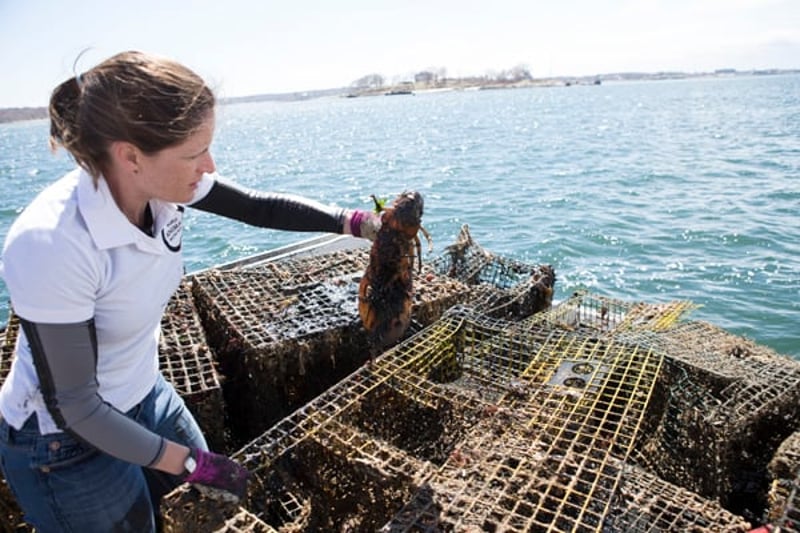
Working with our partners in the US to remove lost and abandoned fishing gear
News
We recently completed a successful Gear Grab expedition off the coast of Portland in the United States with the Gulf of Maine Lobster Foundation. We removed ghost gear, lost and abandoned fishing gear, from Maine waters.
On Friday, May 1, representatives from both organizations worked together with local fishermen to locate and remove lobster traps that had accidentally lost their buoys and other marine debris such as rope and nets. Predominant causes of gear loss include loss of buoys due to recreational boaters and/or extreme weather or strong currents.
Altogether, we removed some 147 derelict traps, as well as over 450kg of rope and line, from local waters. All animals found inside lost traps, including lobsters, crabs, sea stars, urchins and fish, were released back into local waters, and 44 traps that were still in good condition were returned to their owners. Derelict gear that could not be reused will be recycled by the NFWF Fishing for Energy Program, which provided a dumpster and haul-away for Friday’s Gear Grab.
The event was a success due to collaboration with many fishermen and organizations. A total of five fishermen, Steve Train F/V Wild Irish Rose, David Johnson F/V Moira O’Hare, Tom Martin F/V Lucky Catch, Jim Buxton F/V Nomad and Nick Mancini F/V Maria Rose III, all volunteered their time, vessel and crew to spend the day cleaning up gear from the waters outside of Portland, Maine. We give them many thanks because without fishermen lending a hand, gear retrieval programs like these wouldn’t exist. We would also like to thank the Portland Fish Exchange, Dropping Springs Bait and the Portland Department of Public Works for their generous donation of the wharf, staff and equipment that helped make the day a success.
“The Gear Grab was a model partnership between our organizations and the local fishing industry,” said Elizabeth Hogan, our Oceans and Wildlife Campaign Manager in the US. “We recovered and returned a large volume of lost gear, making local waters safer for marine life and boats, and released trapped animals back into the sea. Collaborative solutions like this show how we can reduce the global volume of ghost gear while promoting a healthy and sustainable fishery.”
“We are so proud to bring our local fishermen to work together in our Gear Grab program,” said Erin Pelletier, Executive Director of Gulf of Maine Lobster Foundation. “It’s designed to engage fishermen, communities and other agencies in a combined effort to support the sustainability of not just the lobster fishery, but any fishery in the Gulf of Maine. Anyone who makes a living on or benefits from the water knows the importance of protecting the ocean. The fishermen in the Gulf of Maine are making a difference by helping clean up what’s out there, and they want to help even more.”
Ghost gear is a significant global problem, with nearly a ton of gear lost for every 125 tons of fish caught, causing significant economic loss. Among lobster fisheries in New England, the loss rate for lobster pots is estimated to be 10-30 percent annually. The number of licensed pots set annually in Maine waters alone reaches close to 3 million, leaving an estimated annual ghost pot accrual of 300,000 per year.
Ghost gear also represents one of the biggest threats to marine animals, with some 640,000 tons of gear lost in the world’s oceans annually. Hundreds of thousands of animals – including seals, turtles, whales and birds – are entangled in gear every year. Many of the plastics used to make fishing gear are highly durable, with some expected to persist in our seas for up to 600 years. It is estimated that half (48–65 percent) of Gulf of Maine humpback whales have been entangled at least once in their lifetime. More than 70 percent of north Atlantic right whales, a critically endangered species, have been entangled in ghost gear.
Through our Sea Change campaign, we're working with partners to reduce the volume of ghost gear, remove it from the world’s oceans, and rescue entangled animals. Make sure to follow us on Facebook and Twitter to find out how you can get involved in the campaign.
“We recovered and returned a large volume of lost gear, making local waters safer for marine life and boats, and released trapped animals back into the sea. Collaborative solutions like this show how we can reduce the global volume of ghost gear while promoting a healthy and sustainable fishery.